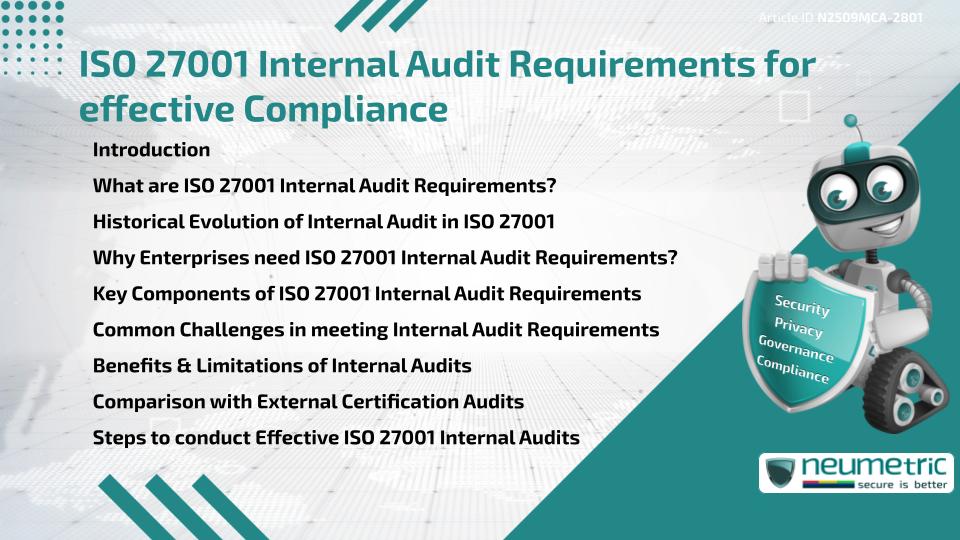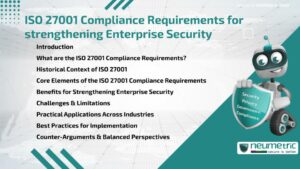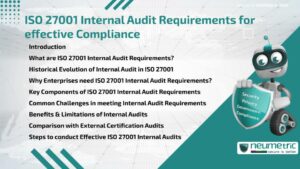Table of Contents
ToggleIntroduction
The ISO 27001 Internal Audit requirements are essential for Enterprises aiming to maintain Compliance with International Security Standards. They ensure that an Organisation’s Information Security Management System [ISMS] is functioning effectively, aligns with the ISO 27001 Standard & remains ready for External Certification Audits. This article explains what the ISO 27001 Internal Audit requirements are, their history, why Enterprises need them, their key components, challenges, benefits & how to conduct them successfully.
What are ISO 27001 Internal Audit Requirements?
The ISO 27001 Internal Audit requirements are specific obligations within the ISO 27001 Framework that compel Enterprises to conduct regular Internal Audits of their ISMS. These Audits evaluate whether Security Controls are properly implemented & effective.
Historical Evolution of Internal Audit in ISO 27001
Internal Audits have always been a cornerstone of Quality & Compliance standards. With the development of ISO/IEC 27001 from the British Standard BS 7799, Internal Audit requirements were formalised to ensure Continuous Improvement in Security Practices. Over time, the ISO 27001 Internal Audit requirements have evolved to keep pace with changing Cyber Threats & Regulatory expectations.
Why Enterprises need ISO 27001 Internal Audit Requirements?
Enterprises rely on the ISO 27001 Internal Audit requirements for several reasons:
- To verify Compliance with ISO 27001 Controls
- To identify Vulnerabilities before Certification Audits
- To demonstrate Accountability to Stakeholders & Regulators
- To ensure Continuous Improvement of Security Practices
Without these Audits, Enterprises Risk failing External Audits, damaging Reputation & facing Penalties for Non-Compliance.
Key Components of ISO 27001 Internal Audit Requirements
The ISO 27001 Internal Audit requirements typically cover:
- Audit Planning: Establishing Audit Scope, Objectives & Criteria
- Audit Schedule: Conducting Audits at planned intervals
- Competence of Auditors: Ensuring Auditors are objective & knowledgeable
- Audit Evidence: Gathering & documenting findings with accuracy
- Corrective Actions: Addressing Nonconformities & Monitoring improvements
Together, these components create a systematic approach to verifying Compliance & improving Security Performance.
Common Challenges in meeting Internal Audit Requirements
Enterprises often face hurdles in fulfilling the ISO 27001 Internal Audit requirements. Some common issues include:
- Lack of skilled Auditors with sufficient knowledge
- Difficulty in maintaining objectivity when using Internal Staff
- Insufficient time or resources to conduct thorough Audits
- Incomplete Documentation of Findings & Corrective Actions
Addressing these challenges requires Training, Resource allocation & sometimes the involvement of External Consultants.
Benefits & Limitations of Internal Audits
The benefits of fulfilling the ISO 27001 Internal Audit requirements include:
- Early identification of Nonconformities
- Better preparedness for External Certification Audits
- Increased trust from Clients & Regulators
- Stronger alignment of Business processes with Security Objectives
However, limitations also exist. Internal Audits can be resource-intensive & their effectiveness largely depends on Auditor competence & objectivity. Additionally, while they identify weaknesses, they cannot guarantee complete Compliance or eliminate all Risks.
Comparison with External Certification Audits
While external Certification Audits validate Compliance for official recognition, Internal Audits are preparatory & ongoing. The ISO 27001 Internal Audit requirements ensure that Enterprises remain ready for Certification by addressing issues beforehand. A useful analogy is that Internal Audits are like practice matches, while External Audits are the championship games.
Steps to conduct Effective ISO 27001 Internal Audits
Enterprises can conduct effective Internal Audits by following these steps:
- Define the Scope & Objectives of the Audit.
- Develop an Audit plan & schedule.
- Assign competent Auditors with appropriate training.
- Collect & analyze Audit Evidence.
- Document findings clearly & objectively.
- Recommend & track Corrective Actions.
- Conduct follow-up Audits to ensure improvements are sustained.
This structured process ensures that Internal Audits contribute to both Compliance & stronger Enterprise Security.
Conclusion
The ISO 27001 Internal Audit requirements are vital for Enterprises aiming to achieve & maintain Compliance with ISO 27001. They provide a structured way to identify weaknesses, strengthen security & prepare for External Certification Audits. Despite challenges, fulfilling these requirements offers significant benefits in terms of Resilience, Trust & Accountability.
Takeaways
- Provide a structured method for verifying Compliance
- Ensure Continuous Improvement of ISMS Performance
- Help Enterprises prepare for External Certification Audits
- Require skilled & objective Auditors
- Can be resource-intensive to conduct effectively
- Do not guarantee absolute Compliance but highlight gaps
FAQ
What are the ISO 27001 Internal Audit requirements?
They are obligations to conduct regular Audits of the ISMS to verify Compliance with ISO 27001.
How often should Enterprises perform ISO 27001 Internal Audits?
They should be conducted at planned intervals, usually annually or as defined in the Audit program.
Who can perform ISO 27001 Internal Audits?
Trained Internal Staff or External Consultants with knowledge of ISO 27001 can perform them.
Do ISO 27001 Internal Audit requirements guarantee Certification?
No, they help identify gaps & prepare for Certification but do not guarantee it.
What are common challenges in fulfilling ISO 27001 Internal Audit requirements?
Challenges include lack of Skilled Auditors, Time constraints & Incomplete Documentation.
How are Internal Audits different from External Audits?
Internal Audits are Preparatory & Internal, while External Audits validate Compliance for Certification.
What happens if Nonconformities are found during Internal Audits?
They must be documented, corrected & followed up to ensure Compliance is restored.
Need help for Security, Privacy, Governance & VAPT?
Neumetric provides Organisations the necessary help to achieve their Cybersecurity, Compliance, Governance, Privacy, Certifications & Pentesting needs.
Organisations & Businesses, specifically those which provide SaaS & AI Solutions in the Fintech, BFSI & other regulated sectors, usually need a Cybersecurity Partner for meeting & maintaining the ongoing Security & Privacy needs & requirements of their Enterprise Clients & Privacy conscious Customers.
SOC 2, ISO 27001, ISO 42001, NIST, HIPAA, HECVAT, EU GDPR are some of the Frameworks that are served by Fusion – a SaaS, multimodular, multitenant, centralised, automated, Cybersecurity & Compliance Management system.
Neumetric also provides Expert Services for technical security which covers VAPT for Web Applications, APIs, iOS & Android Mobile Apps, Security Testing for AWS & other Cloud Environments & Cloud Infrastructure & other similar scopes.
Reach out to us by Email or filling out the Contact Form…





